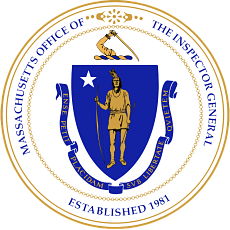3/01/2019
- Office of the Inspector General
Media Contact
Jack Meyers
The OIG examined several aspects of the administration of the MassHealth and the Health Safety Net programs. Highlights from the report include:
- Optometry. When an optometrist treats MassHealth members in a nursing home or other facility, the optometrist may bill MassHealth a travel cost for each member, regardless of how many members received care in the same facility at the same time. The OIG recommends that MassHealth address the billing structure to more appropriately compensate optometrists for travel, and that it expand its program integrity efforts for these providers.
- Adult Foster Care. Adult Foster Care (AFC) providers are submitting claims with the same diagnosis for many, if not most, members and these diagnoses do not appear to justify the need for AFC services. These are red flags, indicating potential fraudulent or improper billing. Additionally, AFC providers are submitting claims for providing “complex care” for members whose primary diagnoses do not appear to warrant that level of care. The OIG recommends that MassHealth improve its review of AFC claims for fraud, waste and abuse to identify and address questionable diagnoses and billing practices.
- Adult Day Health. Some Adult Day Health (ADH) programs submit one claim for multiple days of care without specifying the exact dates of service, making it difficult for MassHealth to provide meaningful oversight. Additionally, some ADH programs billed at rates using 15-minute units when they should have billed at the daily rate (leading to higher reimbursements), consistently billed the same three diagnoses for 75% or more of their members, and submitted claims for diagnoses that do not support the level of billing. The OIG recommends increased oversight, evaluation of 15-minute unit claims, and a requirement that providers bill for ADH services one day at a time.
- Dental Care. MassHealth uses a third party administrator, DentaQuest, to review and approve dental claims. MassHealth does not independently audit DentaQuest to ensure that it is processing claims properly. Instead, DentaQuest to performs “self-audits.” Additionally, MassHealth’s data warehouse lacks all of the necessary claim information for it to provide sufficient oversight of its vendor. Finally, certain providers are using an incorrect code for patients under 3 years of age, and therefore, are receiving higher reimbursements than they are permitted to receive. The OIG recommends that MassHealth regularly audit DentaQuest, address communication between its claim adjudication system and data warehouse, stop permitting providers to bill the higher reimbursement rate, and review policies of other insurers as models to prevent higher reimbursements for improper billing procedure codes.
- Personal Care Attendants. In response to a request from the OIG for information about Personal Care Attendants (PCAs) during a specified date range,MassHealth submitted three sets of data from fiscal intermediaries (who manage PCA administrative issues) that contained significant errors regarding Social Security Numbers, names and dates of birth. This inaccurate data creates the risk of incorrect income reporting to state and federal taxation agencies. Additionally, it prevents effective program integrity efforts and interagency cooperation to reduce fraud, waste and abuse. The OIG directed the PCA program to conduct a risk assessment to determine the source of these errors and to work with fiscal intermediaries to prevent them in the future.
